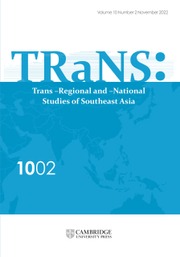Article contents
The ‘Floating’ Ummah in the Fall of ‘Ahok’ in Indonesia
Published online by Cambridge University Press: 28 December 2018
Abstract
The article examines the idea of a ‘floating’ ummah in Indonesia today that affects the workings of Indonesian Islamic politics and democracy itself. It is asserted that the ummah, or community of believers, are more disconnected from the large mainstream Islamic organisational vehicles in Indonesia than is often claimed. A considerable cross-section of this community has become increasingly disaffected with the status quo, as social inequalities sharpen and educated youths who face uncertain futures find appeal in the tough rhetoric of fringe Islamic organisations. This rhetoric emphasises absolute standards of morality as a solution to social and economic predicaments, thereby resulting in the mainstreaming of rigid religious attitudes. Consequently, organisations seen as guardians of ‘religious moderation’ have also picked up on them in an attempt to remain relevant to their increasingly socially heterogeneous constituencies. The overall result is an Islamic politics that has become more intolerant, especially when identity politics gets absorbed into conflicts between different oligarchic factions. This was seen in the dramatic fall of the ethnic-Chinese and Christian former governor of Jakarta known as ‘Ahok’ in 2017.
- Type
- Article
- Information
- TRaNS: Trans-Regional and -National Studies of Southeast Asia , Volume 7 , Issue 2 , November 2019 , pp. 271 - 290
- Copyright
- Copyright © Institute for East Asian Studies, Sogang University 2018
Footnotes
The research for this article was funded by the Australia-Indonesia Centre. It was conducted by the author and Inaya Rakhmani (University of Indonesia), with Andi Rahman Alamsyah (University of Indonesia), Airlangga Pribadi (Airlangga University), and Alfindra Primaldhi and Ayu Larasati (both from the University of Indonesia).
References
References
- 11
- Cited by




